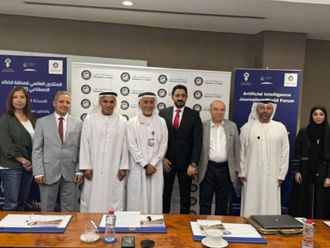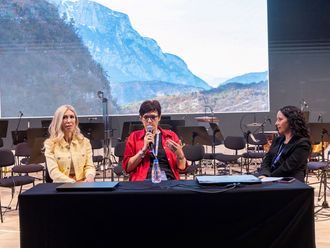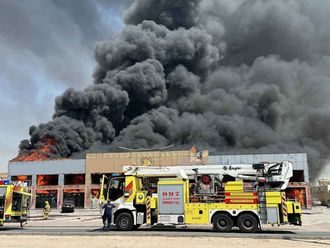Dubai: A UAE-based Filipino migrant workers' group is questioning the integrity of the electoral procedures implemented by diplomatic officials deputed by the Philippine elections commission to run the month-long absentee voting.
In an exclusive interview, the secretary-general of the group Migrante, Emmanuelle Morona, told Gulf News that the alleged wanton disregard for the rules and procedures in the conduct of elections can be considered a ground to declare a "failure of elections" in the UAE.
"From the very beginning, we've been questioning why they [diplomatic officials] refused to be transparent in letting the public observe and even participate in the preparations for absentee voting," he told Gulf News. "They [election inspectors] blatantly disregard the procedures that were set to basically safeguard the integrity of the ballot and they're even telling the people that it's all right."
Morona particularly cited the use of cardboard boxes as ballot boxes and the absence of indelible ink, which Philippine election laws require to be used to mark the index finger of a voter to signify that he or she has already cast the vote.
Security issue
The inking procedure was introduced in the 1984 parliamentary elections as a safeguard against what was termed as "flying voters" or people who resort to multiple voting at the behest of unscrupulous politicians who want them to vote for their candidacies more than once. The procedure was also adopted in other countries like India and Indonesia.
"I raised this issue before the elections board at the Philippine Consulate and I was only told that the Comelec [Commission on Elections] failed to provide them with indelible ink.
Morona also doubts the security of having the ballots and official tally sheets kept in cardboard boxes, saying these can easily be tampered with.
"If metal boxes secured by steel padlocks which were used in elections back home were still vulnerable, how much more these cardboard boxes which are only sealed by plastic packaging tapes," he said.
In separate interviews, Ambassador to the UAE Grace Relucio Princesa and Consul-General to Dubai Benito Valeriano confirmed that the indelible ink procedure was indeed dropped.
"There was no delivery of indelible ink from Manila," she told Gulf News. "We just have to proceed with the voting and do whatever can be done."
Princesa said the election inspectors were instructed to take extra caution in verifying a voter's identity.
"People with ill intentions will not stand a chance to succeed. We strictly monitor the proceedings and we have our own internal control system," Princesa said.
Valeriano, meanwhile, played down the indelible ink issue.
"I don't see it as a problem," he said. He said voters are required to present their passport or any other government-issued identification card like the UAE labour card or driving licence before election inspectors clear them to vote. "If somebody comes here showing the passport or ID of another person who has already voted, then he's in trouble," Valeriano said. "We have our own way of verifying our records."
Elections: Votersget nod
Voters based in Dubai and the northern emirates whose names are in the voters list in the Philippine Embassy in Abu Dhabi are now allowed to cast their votes at the Consulate in Al Qusais in Dubai, a top Philippine mission official said.
Consul-General Benito Valeriano said they were given clearance by the OAV Secretariat in Manila to implement this measure following complaints from registered voters who were turned away during the initial days of the voting.
Voting at the Consulate is under way until May 10. Six polling precincts will be open throughout the week from 8:30am to 4:30pm, except on May 10 when voting starts at 8:30am and ends at 2pm to coincide with the closing hour (6pm) in the Philippines.
Indelible ink issue not confined to the UAE
Dubai: The indelible ink issue is not confined to the UAE. It has also reportedly stained the proceedings in other countries, particularly in Saudi Arabia where over 111,000 Filipino expatriates have registered as absentee voters.
Vice Consul Roussel Reyes of the Philippine Embassy in Saudi Arabia said the Comelec did not send indelible ink and instead were directed to implement other security safeguards in the balloting including signing logbooks, use of computer data and thumbmarks, a report by ABS-CBN said.
"We haven't received delivery of indelible ink from the Comelec and we were told that it is no longer necessary for us to use it since absentee voting will go on for 30 days and that the stain can be removed in a few days," he said. "We have additional safeguards in place that's why we make voters sign many documents."
The Department of Foreign Affairs in Manila however, belied reports that indelible ink has not been used in the process of overseas absentee voting (OAV) in some parts of Saudi Arabia.
"The DFA-Overseas Absentee Voting Secretariat (OAVS) and the Commission on Elections [Comelec] stated that the polling precincts in the Philippine Embassy in Riyadh, Saudi Arabia and the Philippine Labour Office in Al Khobar have used indelible ink in the voting process, and the Comelec is rushing additional supplies to said places, amid a report that the inks may have run out," DFA spokesman Ed Malaya said in a statement.
"After consulting with Comelec Commissioner Armando Velasco, OAV Vice Chair Nestor Padalhin stated that there has been no reported ‘flying voter' incident in any overseas precinct," he added.












